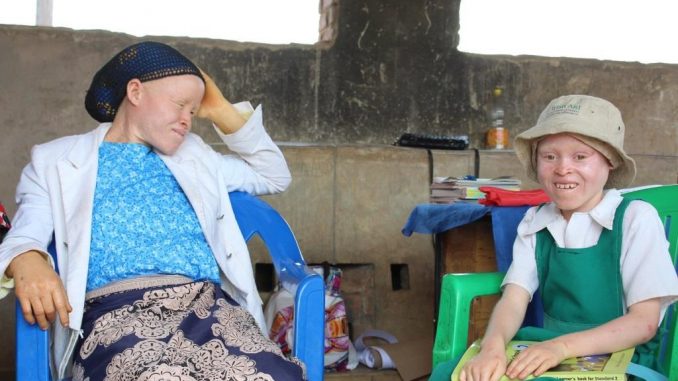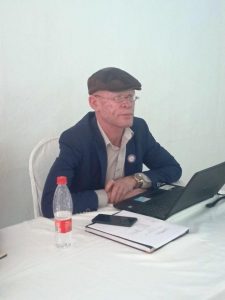
People with albinism in Malawi face numerous human rights abuses such as abductions, killings and mutilations of body parts on the assumptions that their nature boasts of magical powers. IREEN KAYIRA of Malawi News Agency writes on policy changes that offer persons with albinism some hope.
Every morning, Pemphero Willard, wakes up in a desolate state of despair, as the sun emerges from the horizon so do her fears as a person with albinism in a hostile environment.
Stuck between a rock and a hard, she strives to find piece works in order to provide for her nine year old daughter who inherited her condition of albinism.
Willard struggles to earn a living as she is openly discriminated in her village in Dedza. Time and again, she laments seeing her fellow women finding opportunities as she gets sidelined.
“I find it difficult to get money because most of people in the village refuse to give me piece work,” she said.
‘”For instance, to do farm work or gardening, they refuse to give me the work because they believe their plants will not grow because of my condition,” Willard narrated.
To avoid recurrence of this unbearable humiliation, she stays idle at home and laments that it only makes her life harder because she only depends on her husband for support.
Willard is of the view that much as women in general face a lot of challenges, the situation is worse to all women with albinism condition like her.
“This is the harsh reality on the ground. I have a sister who was born with albinism, she has two daughters and we face the same problems,” she said.
Willard is amongst the 134,586 Persons with Albinism (PWA) in the country that are facing difficulties in societies which among others include exclusion from social economic activities, killings and abductions.
These atrocities are being fostered mainly because of ignorance and beliefs that are amongst our societies.
This year alone, an old woman with albinism was attacked in Mzimba which led to her losing her two toes and just recently a grave of a person with albinism was exhumed in Mulanje.
As it stands now the number of attacks against persons with albinism in the country has risen to 168 cases.
Many non-governmental organisations in partnership with government have come up with a number of initiatives and strategies to assist in the protection and promotion of persons with albinism.
National Coordinator for Association of Persons with Albinism (APAM), Overstone Kondowe bemoaned that the initiatives and strategies have not dealt with deep rooted problems faced by PWA.
“Most societies still have beliefs that continue to put the life of a person with albinism in danger,” he said.
From this background, APAM, with funding from Government has embarked on a process of developing a National Policy on security and welfare of PWA that will specifically help to promote and protect the lives of persons with albinism.
The development of the policy is in the first stages and once the policy is finalised within three years.
It is the hope of the Association that it will address the root causes that are driving human rights of violations that Willard and others are subjected to.
Kondowe was optimistic of great changes in the lives of PWA since there would be proper procedures and principle that would be followed by government as well as other stakeholders who are promoting the lives of persons with albinism.
“The kind of response we have been getting so far is that one that deals with a particular issue at that moment but the policy will help to give direction on how we can come up with responses and solutions that are long lasting,” he said.
The Coordinator said these would be well established procedures because they would be research based.
He added that issues to deal with persons with albinism are included in other policies but do not have a wider coverage.
“The National Policy on equalisation of opportunities for persons with disabilities which was launched in 2006 has a little coverage on the rights of persons with disabilities as such our own policy will help us a lot,” Kondowe pointed out.
He stated that the 2012 disability act which is under review does not say anything on the rights of persons with albinism.

Among other things, the national policy will improve protection and security of the rights of PWA as well as increase their opportunities in their day to day activities.
Contents in the policy will encompass views from different stakeholders across the country and these views will form the basis of how issues concerning persons with albinism will be handled.
Upon completion, Malawi will be the second country in Africa after Nigeria to have such policy.
Kondowe revealed that government would take the front role in dissemination of the policy using different channels of communication as well through the social welfare office.
One of the organisations which fight for the rights of children with disabilities Parents of Disabled Children Association of Malawi (PODCAM) believes that the policy will assist a lot in changing the livelihood of people with disabilities.
Amongst the children with disabilities that the organisation fights are children who are born with albinism other disabilities.
Project Officer for PODCAM, Msenga Mulungu said that as of now there is no document that was specifically protecting persons with albinism as such this would be a living tool for the country to have.
“There are some communities whereby new born babies with albinism or any disability are dying in their infancy because such communities believe that those children cannot grow into productive citizens as such they are killed when they are born,” he said.
Mulungu said it would remove all myths around persons with disabilities and albinism that lead to their vulnerability and the nation would learn that that once a child is born is no longer belongs to an individual but the state.
To Willard and other persons with albinism the development of this policy is a ray of a hope.
